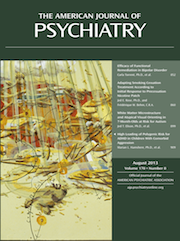Practice-Based or Telemedicine-Based Collaborative Care for Depression
To the Editor: In the editorial (1) accompanying the interesting article (2) on practice-based compared with telemedicine-based collaborative care for depression in the April issue of the Journal, Drs. Simon and Ludman frame the question explored by the study as: Which is better, “locally grown or factory-farmed?”
The study may have answered a rather different question: Which is more effective, supervised or unsupervised mental health treatment? The intervention used nurses with no prior mental health experience as depression care managers. Both the practice-based and the telemedicine-based nurses received an initial 1 day of training and a training manual. Thereafter, the telemedicine-based nurses received weekly supervision, which included a discussion of patients who were not responding to treatment. In contrast, the practice-based depression care managers received no clinical supervision.
The use of unsupervised nurses deviates from the standard practice of collaborative care of depression, which rests on the principle of collaboration between a depression care manager, the primary care provider, and a consulting psychiatrist (3, 4). The IMPACT Intervention Manual specifies that “The [depression care manager] should receive clinical supervision and consultation from a liaison primary care physician and from a team psychiatrist during a weekly team meeting at the primary care clinic” (5). The treatment provided by the unsupervised practice-based depression care managers was by no means equivalent to that of the supervised telemedicine-based depression managers.
It is premature, therefore, to conclude that “factory-farmed” is better than “locally grown.” Indeed, the study can be seen to demonstrate the unsurprising finding that providing weekly supervision and consultation to nurses with no prior mental health experience leads to more effective treatment and better outcomes.
1 : Should mental health interventions be locally grown or factory-farmed? Am J Psychiatry 2013; 170:362–365Link, Google Scholar
2 : Practice-based versus telemedicine-based collaborative care for depression in rural federally qualified health centers: a pragmatic randomized comparative effectiveness trial. Am J Psychiatry 2013; 170:414–425Link, Google Scholar
3
4
5



